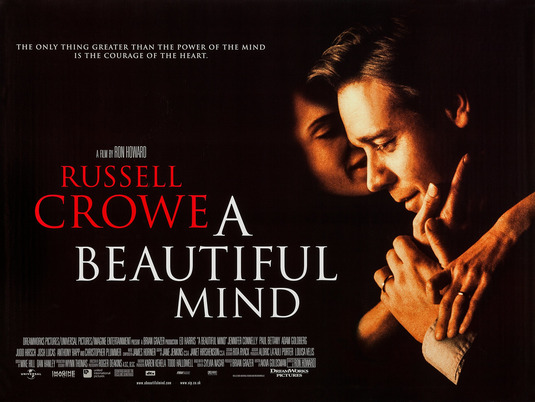1. Early Life at Princeton
John Nash (Russell Crowe), a brilliant but socially awkward mathematician, begins his graduate studies at Princeton in the late 1940s. From the beginning, Nash struggles to fit in with the other students, especially Martin Hansen (Josh Lucas), who often mocks him. Eschewing traditional research and education, Nash is obsessed with finding original mathematical ideas that will shape the world.
Nash’s brilliant mind is undeniable, but his antisocial behavior and eccentric nature make it difficult for him to interact with others. His only friend at Princeton is his charming and helpful roommate, Charles Herman (Paul Bettany), who keeps him company and helps him cope with his loneliness.

2. Breakthroughs and Professional Success
Nash eventually makes a breakthrough discovery and develops a new theory of government dynamics that challenges traditional economic theory. His innovative ideas bring him fame and open the door to a professional career. He secures a prestigious position at the Massachusetts Institute of Technology (MIT), where he works on his theory and teaches.
During this time, Nash meets Alicia Larde (Jennifer Connelly), a beautiful and intelligent student in one of his classes. Alicia is impressed by Nash’s intellectual talents and intrigued by his introverted personality. They begin dating, and eventually, they fall in love and marry.
3. Onset of Schizophrenia
As Nash’s career continues to rise, he is contacted by a mysterious U.S. Department of Defense official named William Parcher (Ed Harris), who recruits Nash for a top-secret mission to decode Soviet codes hidden in newspapers and magazines. Nash becomes deeply involved in this covert operation, believing he is helping the U.S. government uncover a Soviet conspiracy.
Nash’s behavior becomes increasingly erratic, worrying Alicia and his colleagues. He becomes obsessed with his secret missions and starts to isolate himself.
4. Revelation
Nash’s paranoia and delusions reach a climax when he is confronted by Dr. Rosen (Christopher Plummer), a psychiatrist, and is forcibly committed to a psychiatric clinic. There, Nash learns a shocking truth: he has paranoid schizophrenia, and many of the people and experiences he believes are real—including Parcher, his government job, and his best friend Charles Herman—are hallucinations created by his mind.
5. The Struggle to Recover
Nash’s medication helps reduce his hallucinations, but it has serious side effects that dull his intellect, making him unable to perform mathematical tasks. Frustrated, Nash secretly stops taking his medication, and his delusions return.
Nash decides to confront his hallucinations when he realizes that Charles Herman’s young niece, Marcy (Vivienne Cardone), has not aged during the years he has seen her, proving that she is a figment of his imagination. With Alicia’s support, Nash learns how to live with his illness.
6. Triumph and Recognition
As years pass, Nash gradually returns to academia, managing to live with his hallucinations by recognizing them as unreal. His colleagues at Princeton, once skeptical, come to admire his perseverance. In the final act, Nash is awarded the Nobel Prize in Economics for his groundbreaking work on game theory. In his acceptance speech, Nash acknowledges the vital role Alicia played in his survival and recovery.
A Beautiful Mind received widespread acclaim and numerous awards and nominations. Here’s a breakdown of the most significant accolades:
Academy Awards (Oscars)
- Won:
- Best Picture
- Best Director (Ron Howard)
- Best Supporting Actress (Jennifer Connelly)
- Best Adapted Screenplay
- Nominations:
- Best Actor (Russell Crowe)
- Best Film Editing
- Best Original Score
Golden Globe Awards
- Won:
- Best Motion Picture – Drama
- Best Director (Ron Howard)
- Best Supporting Actress (Jennifer Connelly)
- Nominations:
- Best Actor in a Motion Picture – Drama (Russell Crowe)
- Best Screenplay
BAFTA Awards
- Nominations:
- Best Film
- Best Actor in a Leading Role (Russell Crowe)
- Best Supporting Actress (Jennifer Connelly)
- Best Adapted Screenplay
- Best Film Editing
Screen Actors Guild Awards
- Nominations:
- Outstanding Performance by a Male Actor in a Leading Role (Russell Crowe)
- Outstanding Performance by a Female Actor in a Supporting Role (Jennifer Connelly)
- Outstanding Performance by the Cast of a Motion Picture
Other Awards and Honors
- Critics’ Choice Awards: Won Best Picture and Best Director; nominated for several others.
- AFI Awards: Named one of the Top 10 Movies of the Year.
- National Board of Review: Won Best Supporting Actress (Jennifer Connelly) and named one of the Top 10 Films of the Year.
Overall Impact
A Beautiful Mind is often remembered not just for its awards, but also for its powerful storytelling and portrayal of mental illness, which contributed to a broader public understanding of schizophrenia. The film continues to be celebrated in various film retrospectives and discussions about biographical dramas.


What a movie! ❤️❤️